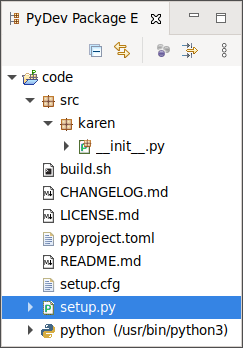Now that we’ve got Eclipse up and running it is time to create our empty Python project. In our case we want the project to be ready for some automated package building so that we can deploy it to PyPi.org or other Python package providers.
To set up an empty project the process is pretty simple. (I’m building on Debian/Ubuntu Linux and using “python3” instead of “python” so your setup may vary a little.)
First, we need to decide which non-Python files we want to include in our project. In my case I plan to include a license, changelog, and readme. I prefer the markdown syntax. I also prefer the defacto standard file names as well (all caps) and those will go in the root folder.
For our setup configuration we’ll specify that with a setup.cfg file. The setup.cfg is used by PyPi to build your program so the options here are pretty advanced. My setup however is fairly basic so have a look.
[metadata]
name = karen
author = lnxusr1
author_email = lnxusr1@localhost
version = attr: src.karen.VERSION
description = Project Karen
long-description = file: README.md
long_description_content_type = text/markdown
keywords = Artificial Intelligence, AI, Personal Assistant
license = MIT
home-page = https://projectkaren.ai
classifiers =
License :: OSI Approved :: MIT License
Programming Language :: Python :: 3
Operating System :: OS Independent
project_urls =
Bug Tracker = https://github.com/lnxusr1/karen/issues
Changelog = https://github.com/lnxusr1/karen/blob/master/CHANGELOG.md
#[build-system]
#requires =
# {install_requires}
[options]
python_requires = >= 3.6
zip_safe = false
include_package_data = true
test_suite = tests
setup_requires =
setuptools
# setuptools >=30.3.0 # minimal version for `setup.cfg`
# setuptools >=38.3.0 # version with most `setup.cfg` bugfixes
#install_requires =
# {install_requires}
#tests_require =
# {tests_require}
package_dir=
=src
packages=find:
[options.packages.find]
where=src
Then we need a setup.py file which is very, very simple. Here are the contents of my setup.py file in the root of my project. It’s just two lines.
import setuptools setuptools.setup()
The setup.py will read the configuration out of the setup.cfg file so no need to duplicate our configuration in this file.
Lastly, we need to add a src folder which is where we will put our actual module. I added a module called “karen” and an “__init__.py” file with a version in it. Pretty simple, but here’s my module.
# version as tuple for simple comparisons VERSION = (0, 5, 1) # string created from tuple to avoid inconsistency __version__ = ".".join([str(x) for x in VERSION])
And here is what my package looks like:

If you haven’t already installed the setuptools package then you need to do that (“pip3 install setuptools”), but once it’s installed we can test out our setup.py and try to build our module.
$ python3 setup.py --version 0.5.1
And you can build your package with this command:
$ python3 setup.py sdist bdist_wheel running sdist running egg_info creating src/karen.egg-info writing src/karen.egg-info/PKG-INFO writing dependency_links to src/karen.egg-info/dependency_links.txt writing top-level names to src/karen.egg-info/top_level.txt writing manifest file 'src/karen.egg-info/SOURCES.txt' reading manifest file 'src/karen.egg-info/SOURCES.txt' writing manifest file 'src/karen.egg-info/SOURCES.txt' running check creating karen-0.5.1 creating karen-0.5.1/src creating karen-0.5.1/src/karen creating karen-0.5.1/src/karen.egg-info copying files to karen-0.5.1... copying README.md -> karen-0.5.1 copying pyproject.toml -> karen-0.5.1 copying setup.cfg -> karen-0.5.1 copying setup.py -> karen-0.5.1 copying src/karen/__init__.py -> karen-0.5.1/src/karen copying src/karen.egg-info/PKG-INFO -> karen-0.5.1/src/karen.egg-info copying src/karen.egg-info/SOURCES.txt -> karen-0.5.1/src/karen.egg-info copying src/karen.egg-info/dependency_links.txt -> karen-0.5.1/src/karen.egg-info copying src/karen.egg-info/not-zip-safe -> karen-0.5.1/src/karen.egg-info copying src/karen.egg-info/top_level.txt -> karen-0.5.1/src/karen.egg-info Writing karen-0.5.1/setup.cfg creating dist Creating tar archive removing 'karen-0.5.1' (and everything under it) running bdist_wheel running build running build_py creating build creating build/lib creating build/lib/karen copying src/karen/__init__.py -> build/lib/karen installing to build/bdist.linux-x86_64/wheel running install running install_lib creating build/bdist.linux-x86_64 creating build/bdist.linux-x86_64/wheel creating build/bdist.linux-x86_64/wheel/karen copying build/lib/karen/__init__.py -> build/bdist.linux-x86_64/wheel/karen running install_egg_info Copying src/karen.egg-info to build/bdist.linux-x86_64/wheel/karen-0.5.1-py3.7.egg-info running install_scripts adding license file "LICENSE.md" (matched pattern "LICEN[CS]E*") creating build/bdist.linux-x86_64/wheel/karen-0.5.1.dist-info/WHEEL creating 'dist/karen-0.5.1-py3-none-any.whl' and adding 'build/bdist.linux-x86_64/wheel' to it adding 'karen/__init__.py' adding 'karen-0.5.1.dist-info/LICENSE.md' adding 'karen-0.5.1.dist-info/METADATA' adding 'karen-0.5.1.dist-info/WHEEL' adding 'karen-0.5.1.dist-info/top_level.txt' adding 'karen-0.5.1.dist-info/RECORD' removing build/bdist.linux-x86_64/wheel

